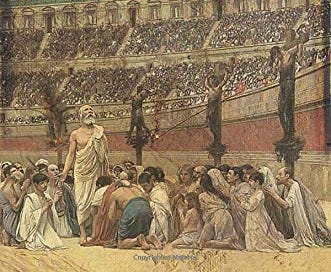If you are looking for the beginning of the study for Eusebius’ Church History then you can go HERE for a brief introduction. At the bottom of the introduction you will find the links to each section of the study guide as it becomes available. If you would like to see the growing list of book studies available for free on this site you can go HERE. Enjoy!
Virtues/Vices/Great Ideas: (Find them in the Text)
Deception, Providence, Peace, Unity, Destruction
Grammar Questions: (The Information of the Text)
In what manner were the Montanist “prophets” disposed to give their prophetic utterances?
What were some of the false doctrines taught by Montanus according to Apollonius?
What evil deeds among the followers of Montanus, such as Themiso and Alexander, did Apollonius expose thereby showing their true character?
According to Irenaeus, how would Polycarp have reacted if he had heard the “opinions” of the Roman schismatics?
According to Eusebius, what were things generally like for the Christians during the time of Commodus’ reign?
According to the text, why were there two different reckonings for the celebration of Easter/Passover?
What did Victor, the bishop of Rome, want to do with the Asian Dioceses?
What does Irenaeus’ name mean?
What did Paul of Samosata and his fellows teach about Jesus?
What did the apologist, writing against the heretics, say about the various “corrected” copies of the Scriptures made by the heretics?
Logic Questions: (Interpreting, Comparing/Contrasting, Reasoning)
Why might the Scriptures “forbid a prophet from accepting gifts and money?”
Though it is just a tradition (not a sure thing said in Scripture) why might Jesus have “ordered his apostles not to leave Jerusalem for twelve years?” What, potentially, would be the purpose in that?
What did Irenaeus mean when he said, “what we learn in childhood adheres to the mind and grows with it?”
What was Polycrates’ essential argument as to why he believed that Easter/Passover should be celebrated on the 14th day of the Jewish New Year?
What was Irenaeus' argument as to why the disagreement over Easter should not divide Christians from fellowship with one another?
What do Polycrates’ and Iranaeus’ arguments have in common as far as their method?
What are some of the various ways in which we see the orthodox Christians exposing the falsity of the heretics? What tactics are they using to affirm the truth and condemn the lie?
Rhetoric Questions: (The Analysis of Ideas in the Text)
Every Sunday is a “Holy Day” since it is the Lord’s Day (the day Christ rose from the dead). Christians are urged in Scripture not to forsake the assembly of the saints (Heb. 10:25). Beyond the Christian day of worship each week, should Christians feel compelled to celebrate any particular holiday? How important are holidays like Christmas and Easter to the Christian life? Explain your answer carefully.
Theological Analysis: (Sola Scriptura)
Read Romans 14:1-12. How should this passage affect our thinking about the controversy we read about over the celebration of Easter?



